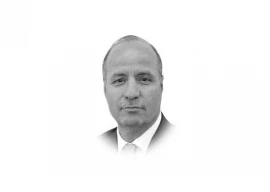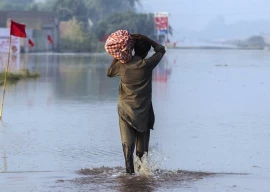
With the general election in the country delayed beyond the constitutional timeframe, the debate rages whether Superior Courts can interference in the prevailing political crisis as a way forward.
As per the Constitution, it is the duty of the Election Commission of Pakistan (ECP) to hold elections to the National Assembly, provincial assemblies and local governments as iterated under Article 219(d). The predicament starts from the Supreme Court’s judgment on Article 63A, beginning with the contention that judges are freer when it comes to constitutional interpretation. This is because, while statutes “are designed to meet the fugitive exigencies of the hour”, constitutions must “endure for ages to come”. The judgment, written by Justice Muneeb Akhtar, further accentuated discussing Article 17(2) (re every citizen’s right to form a political party). The judgment reaches multiple conclusions on the basis of this historical survey: first, that the rights recognized by Article 17(2) are not just the rights of citizens, but the independent rights of a political party in and of itself; second, that these rights must be interpreted to promote the healthy operation of political parties; third, that the defection of legislators negates this “healthy operation”; and fourth, that therefore Article 63A should be interpreted to exclude the votes of defecting parliamentarians. Only this way, per Justice Muneeb, can one ensure that Article 63A functions in its true spirit — so that it is never needed. Hence, the outcome was that Prime Minister Imran Khan was disqualified.
After Khan’s removal from office, a new coalition government (PDM) was formed. Under the PDM’s tenure of 16 months, the country’s economy suffered an unprecedented decline, with none of the indicators offer anything to write home about.
Simultaneously, there is political instability — being exacerbated due to the delay in the elections. Various writ petitions were filed before the Lahore High Court. The matter was heard by Justice Jawad Hassan who decided that the prayer made in the “consolidated petitions” is allowed and the ECP is directed to immediately announce the “date of election” of the Provincial Assembly of Punjab with the notification specifying reasons, after consultation with the Governor, being the constitutional Head of the Province, to ensure that the elections are held not later than ninety days as per the mandate of the Constitution.
Under Article 224(2), it is clear that after the dissolution of the National or Provincial Assembly, the elections need to be held within 90 days and the results declared no later than 14 days. Since the Constitution is well-defined in terms of the time period for holding elections, Justice Jawad’s judgment is unambiguous and correct. On the other hand, the PDM parties did not accept the judgment, and various intra-court appeals were filed which are still sub judice. The interference of the Supreme Court came under Article 184 (3) i.e. suo motu action.
While the interference is important to some extent, a question that arises is: does Supreme Court have the authority to take a suo motu notice when concurrent proceedings are sub judice before a lower court? Powers under Article 184(3) were first invoked in the famous Manzoor Elahi case in 1975. Decades later, during Chief Justice Chaudhary Iftikhar’s time, some 75 suo motu notices were taken while Chief Justice Saqib Nisar took more than 100 suo motu actions.
In the current suo motu case, a nine-member bench of the top court was formed, which was rendered to a three-member bench due to recusal by the other judges. Worth noting is the dissenting note by Justice Mansoor Ali Shah that if there is a concurrent proceeding before an High Court then the Supreme Court does not have the power to initiate suo motu proceedings. This stems from the principle of Res Judicata that when a matter is already pending in a court, it cannot be heard by another court. In the current scenario though, the Supreme Court is hearing the election matter which is already sub judice before a High Court.
The dissenting note doesn’t create any significance, nor is it binding, but it does indicate diverse perspectives among the judges.
Now let’s come back to the role of the Supreme Court on political matters. Let’s suppose the suo motu powers prevail and the decision of the Supreme Court leads towards a delay in the election. Then what? It would have its own pros and cons.
Holding of elections on time would help abate political uncertainty — something which may lead to improved economic indicators. An improved financial situation would give confidence to the sitting government to work for helping the country said through the prevailing crises.
On the contrary, a delay in the elections would invite reaction from the PTI — both in the form of legal action and street protests. It goes without saying that it would add to the prevailing political uncertainty in the country which would also drive economic instability.
In the light of above, I believe interference from the Supreme Court is important. The CJP’s judgment does give a hope for the country to avoid further chaos by holding the election in line with the constitution. But there is still a question mark on whether the elections will be held in compliance with the CJP’s judgment or the hidden forces could still get the elections delayed?
Let people be the judge as to who should hold the reins of the country. By the way, people not only can judge but lead as well. It’s apt to quote Nelson Mandela here: “Everyone can rise above their circumstances and achieve success if they are dedicated to and passionate about what they do.”
Published in The Express Tribune, September 10th, 2023.
Like Opinion & Editorial on Facebook, follow @ETOpEd on Twitter to receive all updates on all our daily pieces.





1725967717-0/Untitled-design-(3)1725967717-0-165x106.webp)







COMMENTS
Comments are moderated and generally will be posted if they are on-topic and not abusive.
For more information, please see our Comments FAQ